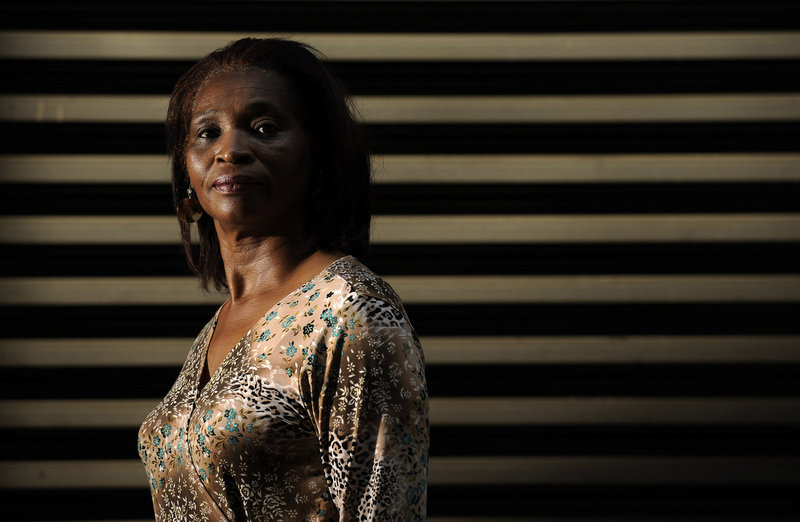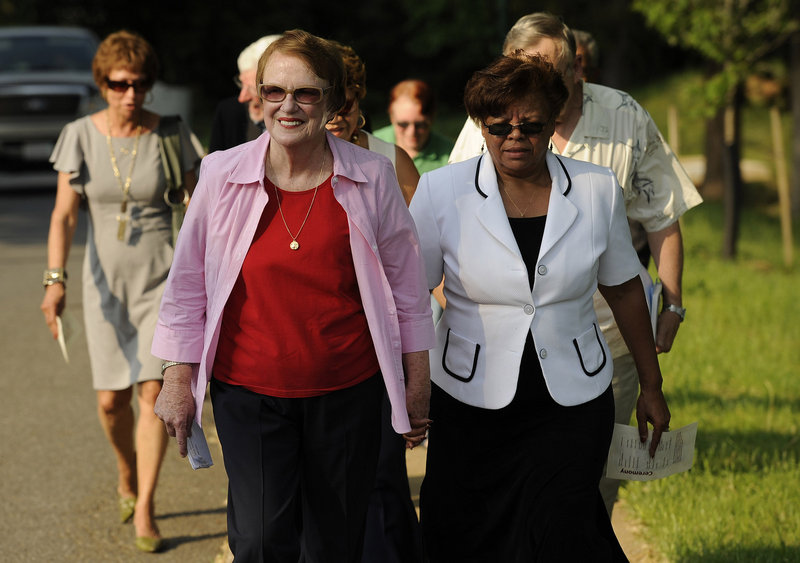Half a century after many Virginia public schools shut their doors rather than accept black students, the state is offering college scholarships to compensate those whose education suffered in the era of “massive resistance” to desegregation. Among the recipients: white students.
Since 2004, about 70 people have won the scholarships, including a handful of white Virginians whose schooling was disrupted in the late 1950s and early 1960s. A precise count of white scholarship recipients was unavailable, but the total is thought to be fewer than 10.
Officials who oversee the state program say they want to spread the word to more white students who might be eligible.
“Both black and white students lost an opportunity because of the state’s decision, and both deserve this aid,” said Brenda Edwards, who administers the Brown v. Board of Education Scholarships for the Virginia Division of Legislative Services.
FAIR TO INCLUDE WHITES?
“White people hear ‘Brown v. Board,’ and they think they’re not eligible. We’re trying to change that perception. … We want more people to get the education they missed out on years ago.”
Phyllis Archer, 57, a scholarship recipient who is black, said the push to include white students in the program is misguided. “This was the state’s chance to apologize for wrongdoing, not to award people who have never known racism,” Archer said.
June Jeffrey, 69, is also a scholarship recipient. She is a real estate agent who is studying English at Lord Fairfax Community College in Warrenton and is white.
In 1958, four years after the landmark Supreme Court ruling that found school segregation unconstitutional, Jeffrey’s high school in Warren County closed its doors.
While black students left the county or attended loosely organized classes in living rooms and church basements, Jeffrey’s school re-established itself as the Warren County Education Foundation School, which enrolled only white students. It held classes in buildings across town, keeping the same teachers and paying them partly with public funds.
When a federal court ruled in February 1959 that Warren County schools must integrate, Jeffrey and most of her classmates remained at the all-white foundation school. But she said they lost access to facilities, counseling and the trappings of a traditional high school experience.
“We missed having a real senior year,” Jeffrey recalled. “We just wanted to finish up with our friends.”
Jeffrey detailed those experiences when she applied for the scholarship years later.
“I was just hoping that they wouldn’t ask me for a photo,” she said. She wasn’t sure whether white students qualified.
Not only do they qualify, she later learned, but officials are traveling the state to inform residents – including whites – of their eligibility. Former students whose public schools in Arlington County, Charlottesville, Norfolk, Prince Edward County or Warren County closed in the late 1950s and early ’60s are eligible.
A TROUBLED RACIAL HISTORY
The effort to recruit white applicants has reopened wounds from Virginia’s painful racial history.
Archer, who is working toward a degree in nonprofit management from the University of Richmond, said she wonders whether some scholarship recipients are from families that defended segregation. “That’s really unacceptable,” she said.
From kindergarten to second grade, Archer bounced between “black schools” in Prince Edward County churches, run by volunteer instructors. She remembers, at 6 years old, asking through tears about the reason for the disruption.
“Some people just don’t like us,” her mother said.
To Archer and others, the scholarship program represents more than compensation for schooling disruptions: It also is an acknowledgment that segregation was immoral. Offering the award to white students, Archer said, dilutes that message.
For years, Virginia has wrestled over how to recognize its troubled racial history.
Tensions surfaced last year when Republican Gov. Robert McDonnell omitted any mention of slavery when he proclaimed April “Confederate History Month.” He later apologized.
From 1984 to 2001, the state declined to set aside a holiday dedicated only to the memory of the Rev. Martin Luther King Jr.
Instead, Virginia had a Lee-Jackson-King Day, commemorating the slain civil rights leader alongside two Confederate generals, Robert E. Lee and Stonewall Jackson. The state now has a separate holiday in January for Lee and Jackson.
In 2003, the General Assembly debated whether to “express regret” or “apologize” for the massive resistance policy in a public resolution.
“The feeling was, ‘We didn’t do this, so why should we apologize?’ ” said Democrat Viola Baskerville, then a delegate from Richmond.
The subsequent declaration of regret stated that both black and white Virginians “were affected as well by the deep, contentious division created by the denial of public education to the African-American community.”
SIMILAR QUESTIONS ELSEWHERE
When the scholarship was created, state officials faced thorny questions over who deserved compensation and what form it should take.
Similar questions have arisen elsewhere:
• In 2001, a task force in Harrison, Ark., considered providing scholarships to black students a century after African-American residents had been driven out of town by a white mob.
• In 2004, a federal court weighed whether Oklahomans should receive compensation for a 1921 Tulsa race riot.
• In 2006, the Brown University community in Rhode Island debated whether the school should make financial amends for its use of slave labor.
None of those debates resulted in concrete reparations. When Virginia lawmakers considered the Brown v. Board scholarship, they were on new ground. Experts say that no other state has such a scholarship.
“This wasn’t easy,” said Baskerville, who sponsored the scholarship legislation. “And it would have been much harder politically if it was only tailored to black students.”
Send questions/comments to the editors.




Success. Please wait for the page to reload. If the page does not reload within 5 seconds, please refresh the page.
Enter your email and password to access comments.
Hi, to comment on stories you must . This profile is in addition to your subscription and website login.
Already have a commenting profile? .
Invalid username/password.
Please check your email to confirm and complete your registration.
Only subscribers are eligible to post comments. Please subscribe or login first for digital access. Here’s why.
Use the form below to reset your password. When you've submitted your account email, we will send an email with a reset code.